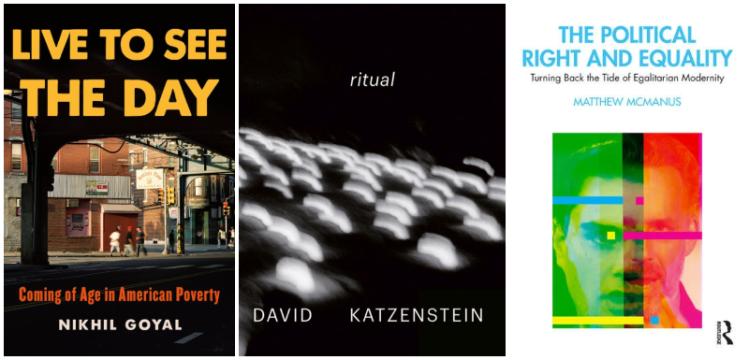
Kensington is the poorest part of Philadelphia, a neighborhood where the drug trade is rampant, living conditions are precarious or hazardous, and babies have a life expectancy on par with that of Egypt, Bhutan, and Uzbekistan. In Live to See the Day: Coming of Age in American Poverty, sociologist Nikhil Goyal chronicles the lives of three children navigating underfunded schools, abuse and instability at home, the ubiquity of drugs and violence, and a criminal-justice system that could derail their lives. “This story is one of survival,” writes Goyal, “where eighteenth-birthday celebrations are not rites of passage but miracles.” Goyal, a former policy adviser for Sen. Bernie Sanders, insists that we don’t have to consign children in the Kensingtons of America to destitution. “A decent, fair society will only come about with…a cradle-to-grave social democracy.”
Live to See the Day
Coming of Age in American Poverty
Nikhil Goyal
Metropolitan Books
$29.99 | 352 pp.
Photographs of religious ceremonies in places like Guatemala, India, and Morocco usually tend toward the exotic: bright colors and frenzied compositions that dazzle viewers. David Katzenstein’s work—the result of his travels through twenty-six countries over nearly forty years—is subtler and more measured, using black and white to infuse his subjects with an earthy dignity while imbuing their sacred rites with solemnity. His lens is refreshingly egalitarian, finding harmonies across spiritual and secular communities in places as diverse as Senegal and Turkey, Jerusalem and Bhutan, Brooklyn and Queens. Careful attention to smiling faces and ceremonial clothing also reveals a rare humility on the artist’s part, showing us that practicing photography—or any art—with curiosity and respect for others can also be a form of self-expression and self-discovery.
Ritual
David Katzenstein
University of Chicago Press
$39.95 | 160 pp.
“‘The right’ is anything but a unitary intellectual and political tradition,” writes Matthew McManus, a lecturer in political science at the University of Michigan, in The Political Right and Equality: Turning Back the Tide of Egalitarian Modernity. And yet this disparate network of right-wing thinkers—“a fair share of cranks and crackpots, as well as men of genius and even profundity”—has nevertheless inspired right-wing governments around the world. Central to this conservative, reactionary tradition are political grievance and an unsettling, unapologetic hostility to equality. Conservative thinkers contend that people are unequal and should therefore be treated unequally. By cataloging the intellectual roots of right-wing grievance politics, McManus reminds interested parties that, if we want
to preserve the egalitarian thrust of liberal modernity, we’d do well to learn how to address the Far Right’s arguments against it.
The Political Right and Equality
Turning Back the Tide of Egalitarian Modernity
Matthew McManus
Routledge
$39 | 290 pp.

